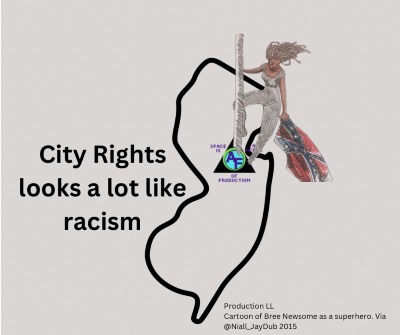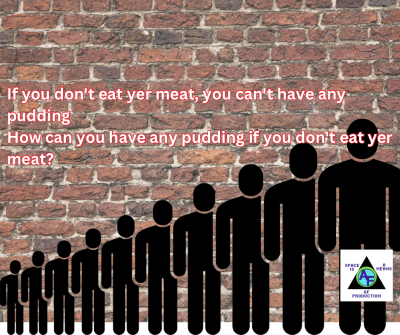A list of what a second Trump term could look like in Urban America— and actions to combat it

As the acid rain film settles on the recent election, a sobering predicted truth emerges for women residing in America's urban centers. The prospect of a second Trump presidency casts a long shadow over the hard-won progress in women's rights and other tenets of social equality.
From healthcare to housing, economic opportunities to personal safety, the potential ramifications of Trump's policies loom large for urbanism and the women that work and live there.
I've spent years advocating for the use of a feminist lens in designing our cities, and I am furious at what is down the track. Yet, we can't afford to be paralyzed by fear.
For documentation purposes here I layout the myriad ways Trump's second term could impact women in America's cities. We'll examine potential policy shifts, their real-world consequences, and most importantly - how we can fight back.
Eroding Reproductive Rights and Healthcare Access
The specter of further restrictions on reproductive rights looms large over urban women and nonbinary people. Trump's first term saw relentless attacks on abortion access, a second term promises far worse.
The Threat of a National Abortion Ban
While individual states currently determine abortion laws, Trump has hinted at supporting a national ban. Republican Representative Eric Burlison’s Life at Conception Act has almost 70 cosponsors. This would devastate access even in pro-choice urban centers that have worked to protect reproductive rights. Women in cities like New York, New Jersey and Los Angeles, who currently enjoy strong abortion protections, could suddenly find themselves without options. States rights will be tested to show that they are more than a fig leaf to cover Southern rooted racism.
Targeting Medication Abortion
The Trump administration will push to restrict access to abortion pills like mifepristone, which have become increasingly vital for urban women seeking abortions. In Louisiana a doctor has already been indicted for prescribing medication to induce an abortion. By leveraging federal agencies like the FDA, they could create bureaucratic hurdles that make these medications harder to obtain, even in states where abortion remains legal.
Defunding Planned Parenthood
Urban Planned Parenthood clinics provide crucial reproductive healthcare services beyond just abortions. Defunding efforts could shutter clinics in cities nationwide, leaving low-income women without access to cancer screenings, STI testing, and other essential care.
Gutting the Affordable Care Act
Trump has repeatedly vowed to dismantle the ACA— and is actively making plans. This would disproportionately harm urban women, especially those with pre-existing conditions or who rely on Medicaid expansion. The loss of contraceptive coverage and maternity care would be particularly devastating.
Economic Insecurity and Workplace Discrimination
Trump's policies threaten to exacerbate the economic challenges already faced by many urban women, particularly women of color and single mothers. The gender pay gaps for women of all cultures and people of color is generally smaller in federal employment, the sector of employment Trump is actively attacking.
Stagnating Wages and Worker Protections
The Trump administration has shown little interest in raising the minimum wage or strengthening worker protections. This hits urban women hard, as they are overrepresented in low-wage service industry jobs prevalent in cities.
Weakening Equal Pay Enforcement
Efforts to close the gender pay gap could be rolled back, allowing workplace discrimination to flourish unchecked. This is especially concerning in high-cost urban areas where every dollar counts for working women.
Attacking Unions
Trump's anti-union stance threatens organizations that have historically fought for better conditions for women workers in urban industries like healthcare, education, and hospitality.
Cutting Social Safety Net Programs
Proposed cuts to programs like SNAP (food stamps) and housing assistance would devastate low-income urban women and their families, potentially forcing difficult choices between food, shelter, and other necessities.
Housing Instability and Homelessness
The affordable housing crisis plaguing many U.S. cities could worsen dramatically under a second Trump term, with dire consequences for urban women.
Slashing HUD Funding
Cuts to the Department of Housing and Urban Development would reduce already scarce affordable housing options in cities. This could push more women and families into homelessness or unsafe living situations.
Weakening Fair Housing Protections
Trump will no doubt continue to roll back Obama-era fair housing rules that he began his first time in office. This could lead to increased housing discrimination against women, especially Black women, single mothers, and seniors in competitive urban rental markets.
Promoting Gentrification
Policies favoring luxury development over affordable housing could accelerate gentrification in urban neighborhoods, displacing long-time women residents and eroding community support networks.
Criminalizing Homelessness
A punitive approach to urban homelessness could disproportionately impact women experiencing housing insecurity, potentially separating mothers from children or exposing vulnerable women to increased violence. One proposal is mandatory work camps.
Safety and Violence Against Women
Trump's rhetoric and policy priorities raise serious concerns about the safety of women in urban environments.
Defunding Domestic Violence Programs
Cuts to violence against women programs would leave urban survivors with fewer resources and support services, potentially trapping them in dangerous situations.
Emboldening Hate and Harassment
Trump's inflammatory language has been linked to increases in hate crimes and street harassment. This creates a more hostile urban environment for women, especially Black women, immigrants, and LGBTQ+ individuals.
Undermining Campus Sexual Assault Protections
Rollbacks of Obama-era Title IX guidelines make it harder for students to report sexual assault on college campuses, a particular concern in university-dense urban areas.
Militarizing Urban Police Forces
Increased police militarization without corresponding accountability measures could lead to more violence against women, particularly Black, Latine, and Southeast Asian women, in urban communities.
Environmental Justice and Climate Change
Trump's anti-environmental stance poses unique threats to women living in urban areas already grappling with pollution and climate impacts.
Gutting Environmental Regulations
Weakening clean air and water protections disproportionately harms urban communities of color, where women often bear the brunt of caring for family members with pollution-related health issues.
Ignoring Climate Change
Inaction on climate change leaves cities vulnerable to extreme weather events, which often impact women most severely due to economic factors and caregiving responsibilities.
Promoting Fossil Fuel Development
Expansion of oil and gas drilling, even in urban areas, threatens the health and safety of nearby communities where women and children spend the most time.
Cutting Green Jobs Programs
Reducing investment in clean energy and sustainability initiatives eliminates potential career paths for women in growing urban green economies.
Education and Childcare
Trump's education policies could have far-reaching consequences for urban women and their children.
Pushing School Choice and Vouchers
Diverting funds from public schools to private options could weaken urban public education systems that many women and their children rely on.
Cutting Head Start and After-School Programs
Reducing funding for early childhood education and after-school care creates additional burdens for working mothers in cities.
Rolling Back Student Loan Protections
Making it harder to manage student debt disproportionately impacts urban women, who are more likely to pursue higher education but face significant wage gaps after graduation.
Promoting Abstinence-Only Sex Education
Restricting comprehensive sex education in urban schools leaves young women without crucial knowledge to make informed decisions about their health and futures.
Immigration and Family Separation
Trump's hardline immigration stance is already having devastating consequences for Latine immigrant women in urban communities.
Expanding ICE Raids in Cities
Increased immigration enforcement creates a climate of fear in urban immigrant communities, potentially separating families and leaving Latine, Black, and other nonwhite immigrant women women vulnerable to exploitation.
Restricting Asylum Claims
Making it harder for women fleeing violence to claim asylum could force them to remain in dangerous situations or push them into the shadows of urban areas.
Ending Temporary Protected Status
Revoking TPS for certain countries could uproot long-time urban residents, many of whom are women who have built lives and raised families in U.S. cities.
Limiting Family-Based Immigration
Restricting family reunification policies disproportionately impacts women, who are more likely to immigrate through family channels.
LGBTQ+ Rights and Protections
Trump's rollback of LGBTQ+ protections has particular implications for queer and transgender women in urban spaces.
Allowing Discrimination in Healthcare
Permitting providers to refuse care based on religious beliefs could leave LGBTQ+ women in cities without access to necessary medical services.
Reversing Workplace Protections
Weakening non-discrimination policies makes it easier for employers to fire or refuse to hire LGBTQ+ women, a major concern in competitive urban job markets.
Banning Transgender People from the Military
This not only limits career options for transgender women and men but sends a broader message of exclusion that emboldens discrimination in urban settings.
Erasing LGBTQ+ People from Federal Data Collection
Removing questions about sexual orientation and gender identity from surveys makes it harder to address the unique needs of LGBTQ+ women in urban policy-making.
Digital Rights and Privacy
In an increasingly connected urban landscape, Trump's stance on tech issues raises red flags for women's digital safety and autonomy.
Weakening Net Neutrality
Allowing internet service providers to prioritize certain content could limit urban women's access to crucial online resources and information.
Expanding Government Surveillance
Increased digital monitoring without proper safeguards poses particular risks for women activists, journalists, and marginalized communities in cities.
Failing to Address Online Harassment
Lack of action on cyber violence and revenge porn disproportionately impacts women, making the internet a more hostile space for urban women to navigate.
Restricting Encryption
Attempts to weaken encryption technology could leave women's sensitive data more vulnerable to breaches and exploitation in densely populated urban areas.
Access to Justice and Legal Rights
Trump's reshaping of the judiciary and approach to civil rights enforcement threaten to erode legal protections for urban women.
Stacking Courts with Conservative Judges
A more conservative judiciary could roll back hard-won legal victories on issues like workplace discrimination and reproductive rights that urban women depend on.
Weakening the Equal Employment Opportunity Commission
Reducing the EEOC's ability to investigate and litigate discrimination cases makes it harder for urban women to seek justice in the workplace.
Limiting Class Action Lawsuits
Making it more difficult to bring collective legal action hampers urban women's ability to challenge systemic discrimination and corporate wrongdoing.
Restricting Legal Aid Funding
Cuts to legal services disproportionately harm low-income urban women who rely on these resources to navigate housing, family, and employment issues.
The Path Forward: Resistance and Resilience
While the challenges ahead are daunting, urban feminists and their allies are far from powerless. Here are some strategies for protecting rights and pushing progress forward:
Local Action and Policy
- Advocate for city and state-level protections to counteract federal rollbacks, lets test out this states’ rights thing
- Plan with regions in mind for example, New York and New Jersey can be one unit and be much more powerful
- Support progressive candidates and ask about their feminist lens in local elections
- Push for municipal policies that address urban women's and other historically excluded groups needs (affordable housing, childcare, etc.)
Grassroots Organizing
- Build coalitions between feminist groups and other social justice movements
- Utilize social media and technology to mobilize urban communities
- Connect with established historic mutual aid networks to support vulnerable people when government safety nets fail
- Educated your communities on the importance of civics and our institutions
Legal Challenges
- Support organizations bringing lawsuits against discriminatory policies
- Volunteer with or donate to legal aid clinics serving urban women
- Document and report rights violations to build cases for future litigation
Economic Empowerment
- Support cooperative business education in urban areas—the market is not god
- Advocate for living wage ordinances and worker protections at the local level
- Create skill-sharing programs for that are inclusive of all people
Cultural Shifts
- Challenge misogynistic narratives in media and popular culture
- Promote diverse (historically, gender, culture) representation in leadership positions
- Educate young people, all people 14 years and old, need to understand the importance of voting and civic actions
The path forward will be challenging, but the resilience and ingenuity of urban planners and city dwellers have always been formidable. By uniting our efforts, staying well-informed, and taking strategic action, we can navigate these difficult times and continue our progress towards genuine equality in our cities and beyond.





